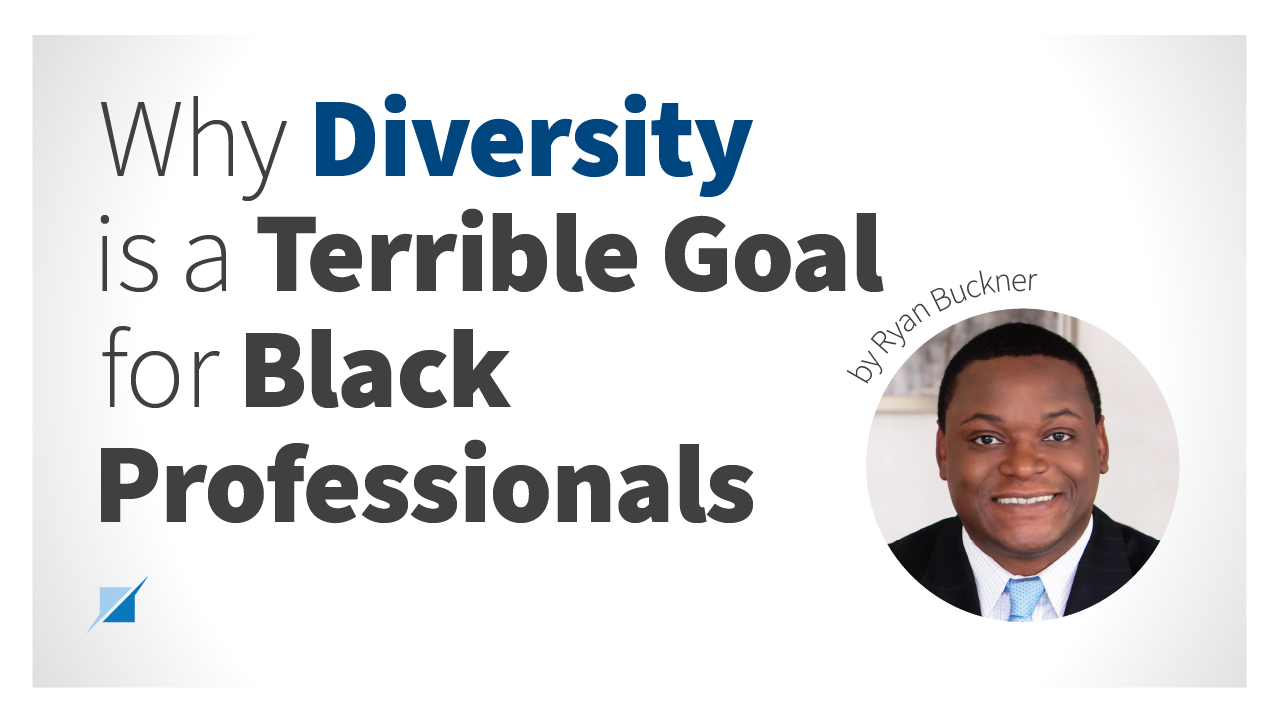
Given the sensitivity surrounding the topic in modern America, the title of this piece is admittedly controversial and purposefully attention-grabbing. But while it’s true that life and the American experience has tremendously improved for most black Americans since the Civil Rights Movement, there remains much opportunity for continued progress. More and more, opportunity and inclusion are becoming paramount in business, but black professionals should not be content with diversity as an objective.
Such an argument right now is apropos, as the nation is currently celebrating Black History Month. It’s an annual time taken to honor the contributions Americans of African descent have made to this great nation, and recognizing such achievement is good. However, at the same time, scores of colleges, universities, businesses and human resource departments everywhere are patting themselves on the backs for their “diversity achievements,” having used skin color and gender as their metrics of choice. Is that good?
Everyone has heard America often referred to as a melting pot or salad bowl—a seemingly fitting metaphor seeking to make plain the value of diverse ingredients working and coexisting in concert for the benefit of a more perfect union. And yet, it’s also important to understand more niche context—just like it’s been said that “knowledge is knowing that a tomato is a fruit, but wisdom is knowing not to put it in a fruit salad,” the same is applicable for diversity in business.
Because businesses are not salads.
 Genome News Network explains that “there are more than three million differences between your genome and anyone else's.” But they also say, “we are all 99.9 percent the same, DNA-wise.” These two sides of the same coin also apply similarly to diversity in business—diversity as a sole goal focuses on a few of the millions of ways that we are different; however, true opportunity and inclusion focus on the 99.9% similarity, as businesses thrive when there is a unified vision among its labor force and a collective will towards the general mission. This is a mandate particularly regarding for-profit organizations where the quality of goods and services is essential, and the laws of basic economics govern all that really matters in business—notably the character, work ethic, and talent of the collected human capital. So given these facts and that 99.9% similarity among us, is it even possible to achieve “diversity?”
Genome News Network explains that “there are more than three million differences between your genome and anyone else's.” But they also say, “we are all 99.9 percent the same, DNA-wise.” These two sides of the same coin also apply similarly to diversity in business—diversity as a sole goal focuses on a few of the millions of ways that we are different; however, true opportunity and inclusion focus on the 99.9% similarity, as businesses thrive when there is a unified vision among its labor force and a collective will towards the general mission. This is a mandate particularly regarding for-profit organizations where the quality of goods and services is essential, and the laws of basic economics govern all that really matters in business—notably the character, work ethic, and talent of the collected human capital. So given these facts and that 99.9% similarity among us, is it even possible to achieve “diversity?”
The Auditing Profession
 When I started my career with one of the top four global accounting firms, I was the only black accountant in my office hired that year and I would remain the only black auditor in that office for three years until I left for other opportunities. In that next job, I was also the only black employee for several years as well. In fact, I have never had a supervisor or manager that was black, and for the first 20 years of my career, I was the only black person in a leadership position in whatever office I worked—not exactly a great picture painted by the salad chefs.
When I started my career with one of the top four global accounting firms, I was the only black accountant in my office hired that year and I would remain the only black auditor in that office for three years until I left for other opportunities. In that next job, I was also the only black employee for several years as well. In fact, I have never had a supervisor or manager that was black, and for the first 20 years of my career, I was the only black person in a leadership position in whatever office I worked—not exactly a great picture painted by the salad chefs.
Over that same time, I received multiple accreditations and certifications (as did 99% of my peer group), multiple professional licenses and awards (as did 99% of my peer group), and developed lasting professional friendships while mentoring several professionals (as did 99% of my peer group). As my career developed and I worked my way up the corporate ladder, I followed a pattern that is not actually very diverse. Everywhere I went, integrity, work ethic, and productivity were the paths to success—not just for me, but for everyone.
I spoke with Dr. Paul Madsen, faculty at the Warrington School of Business at my alma mater the University of Florida, who did specific research on this diversity question in professional accounting and auditing. As an accountant myself, I was intrigued by his work and would recommend reading his paper published in the Accounting Review titled “The Integration of Women and Minorities into the Auditing Profession since the Civil Rights Period.” According to Dr. Madsen, much of the prevalent thinking on diversity in business follows an incomplete, or perhaps flawed methodology, where the analysis involves a comparison of underrepresented groups in particular industries with minority groups in America as a whole—more plainly, he points out that is not an accurate comparison metric to say that given x percentage of female, or Black, or Hispanic, or Asian, or Jewish individuals in the overall American population, the same should be represented in American businesses.
Within his work, Dr. Madsen corrected this analytical flaw and compared how specific minority groups compared across similar professions. His study was a quantitative and comparative analysis of the integration of black Americans (and other groups) in the auditing profession in the United States over a 42-year period—more specifically, since the Civil Rights Movement—and his research results suggest that the auditing profession has a pay structure that is unusual regarding historically underrepresented groups. In other words, for women and black Americans, the auditing profession did not follow the same pay gap discrepancy as other fields. A portion of his comprehensive study also indicated that:
- For black people in particular, all relative pay gaps in the auditing profession were positive gaps.
- For the top third of earners in auditing, pay is generally the same for black people it is for white people.
- The flat pay structure in auditing could be regarded as a success because it is consistent with the common normative ideal ‘‘equal pay for equal work.’’
The Opportunity
 Dr. Madsen’s research also explains that black Americans have generally been poorly represented in the auditing profession, even when compared to other job fields. This is a key finding and consistent with my own experience. In addition to my being the only black professional in my accounting career, I was also one of three black students in my state university’s accounting program, likely less than one percent of all students in the program over my academic tenure.
Dr. Madsen’s research also explains that black Americans have generally been poorly represented in the auditing profession, even when compared to other job fields. This is a key finding and consistent with my own experience. In addition to my being the only black professional in my accounting career, I was also one of three black students in my state university’s accounting program, likely less than one percent of all students in the program over my academic tenure.
Now, as a black accountant in a leadership position, I am keenly aware of my responsibilities to the black community of which I am a part and to the public. Because of the specific nature of my work, I am also keenly aware, and reminded daily, that the very best professionals that I hire, mentor, train, serve and depend on, must be very similar in their good ethics, their integrity, and their high-level subject matter expertise, even as they are diverse in all the ways that don’t actually matter.
Just as the tomato has no place in a fruit salad, tokenism for the sake of tokenism should not be the goal in anything, but especially not in business. Just as organizations should focus on the qualities more pertinent to the job, applicants—whether they be black Americans or anyone else—should continue to demonstrate their individual positive value to the workforce. Dr. Madsen said that “high-quality candidates can come from underrepresented groups,” and this is certainly true in my experience, as the office I now operate out of serves clients with a team comprised of 65% otherwise racial minorities. The path to success is to identify opportunities, make the choices common to winners, and cultivate a similarity with success, because when quality is the goal, diversity doesn’t need to be.




